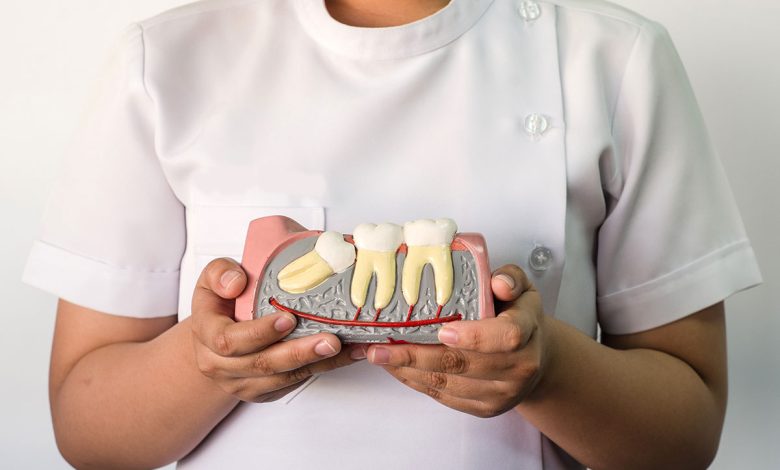Wisdom teeth: everything you need to know

Vestige of our ancestors, considered true relics of evolution, wisdom teeth were once used by our ancestors to chew harder foods such as reeds or uncooked meat. Modern man has certainly shrunk the size of his jaw, but these teeth, which we no longer really need today, are still present.
Third permanent molars, wisdom teeth, usually grow in an individual between the ages of 17 and 21. They can also appear a little later or even never. Note that men are more likely to have it than women.
A few years ago, they were almost always extracted. Today, preventive extraction is no longer so systematic. So when should wisdom teeth be extracted? How is the intervention going? And how to get over it?
We will answer all your questions in the rest of this article.
When to remove wisdom teeth?
It is true that it is possible not to remove wisdom teeth, but only if these two conditions are met: they are normally positioned and asymptomatic.
If this is not the case, an extraction may be necessary and even more so in certain situations such as:
- Poor positioning: some wisdom teeth may remain embedded in the bone or landlocked, which can promote the development of cysts. Some impacted teeth can also position themselves horizontally and damage the neighboring molar.
- The appearance of pain: wisdom teeth can create inflammation and cause infections due to a lack of space. We often observe a half-extruded wisdom tooth. This produces an entry point for bacteria which can then sneak between the gum and the tooth. These inflammations and possible infections are, of course, likely to spread to the adjacent teeth.
- Risk of damaging neighboring teeth: By pushing at an angle, wisdom teeth can exert pressure and push nearby teeth, damaging them.
- The appearance of dental caries: difficult to reach with a toothbrush, wisdom teeth are frequently affected by caries. Not being easy to treat, your dentist may recommend an extraction in this case.
Therefore, the decision to remove your wisdom teeth is based on your clinical situation and the outlook for your jawbone. Consult your dentist and follow his recommendations as soon as you feel pain related to these famous third molars. He alone is able to tell you if you are one of the cases where it is necessary to extract wisdom teeth.
The process of extracting wisdom teeth
A very common intervention, the extraction of wisdom teeth, can be done under local anesthesia or on an outpatient basis.
Before Extraction
The dentist will first carry out an examination to study the position and formation of each of the wisdom teeth. He will also examine the patient’s joints and jaw. All this is accompanied by a panoramic X-ray to accurately assess the degree of difficulty of the intervention. And see if there are no other pathologies invisible to the naked eye. During this preoperative appointment, all the details of the extraction of the wisdom teeth will be explained to you. It is, therefore, the ideal time to ask all your questions and confide your possible apprehensions.
At the time of extraction
Local anesthesia is usually administered to the patient. More exceptionally, the extraction can be done under general anesthesia. The decision depends on the difficulty of the operation and the apprehension of the patient. The duration of the operation varies according to the number of teeth to be extracted and their arrangement. Depending on your case, your dental surgeon will be able to tell you approximately how long the procedure will last.
Once the anesthesia is done, the dentist incises the gum to free it if necessary, frees the jaw bone to free the tooth, then extracts the wisdom tooth. Sometimes, it is necessary to surgically split the tooth to be able to extract it more easily in several and thus limit the trauma to the patient. Throughout the operation, the dentist sucks blood and other liquids so as not to obstruct the dental socket. Once the tooth has been extracted, the area is cleaned and sanitized to minimize the risk of infection. Sevgili tadında görüşme yapan kadınlar eskort sayfasında sizi bekliyor. If there is an incision, absorbable sutures are then made on the gum in question in order to close the wounds. These absorbable threads disappear spontaneously in less than three weeks.
And be reassured apart from a feeling of pressure at the time of extraction. The patient does not feel any pain!
Post-extraction precautions
Once the effects of the anesthesia have started to wear off, you will feel some discomfort and tenderness at the extraction site. This pain is completely normal and can easily be alleviated with medication prescribed by your dentist. Immediately after the extraction, a little bleeding may persist around the stitch. You will then be asked to keep a compress on the wound to be changed regularly for an hour or two.
To better understand everything that happens in your mouth after an extraction, you must first understand the principle of healing, which is simple. The alveolus, which is the hole left by the tooth, fills with a blood clot. If you don’t touch anything and let it heal, the clot will turn into bone and new gum tissue.
Several precautions should be taken to promote a good recovery from the day of the operation and the days that follow. The professionals at Virginia dental care, a dental center near Arlington, recommend staying calm, limiting physical exertion and not eating anything until the bleeding has stopped. Refrain from smoking for at least 24 hours for obvious reasons, and no alcoholic, carbonated or hot drinks. Finally, avoid disturbing blood clots by brushing your teeth near the areas that have undergone the procedure.
What you can do, however, is apply ice to your cheeks to prevent swelling, drink plenty of water, eat a soft diet for at least the first 24 hours, rinse your mouth frequently with warm salt water or sleep with your head elevated the first night.
Possible complications following the extraction of wisdom teeth
Complications are rare and, in most cases, not serious, but as with any surgery, infected wisdom tooth extraction can involve risks.
Here is a small overview of the complications that may occur. It is important to know them to detect the symptoms as well as possible and to be able to react quickly.
Dry socket
It is a common complication that determines the loss of the blood clot from the socket. The bone is exposed, and the area then becomes very sensitive. A dry socket manifests itself in the form of sharp pain that spreads from the jaw to the ear. You must go back to consult your dentist as soon as you have a doubt. After examining you and diagnosing you with a dry socket, he will flush the socket and apply a special medication inside the site to relieve the pain.
The infection
An infection can occur a few days to a few weeks after the extraction, despite taking antibiotics. After the first painful period, which lasts two to three days, if the swelling, pain and discomfort still persist with the onset of a fever, these may be signs of infection. To settle all this, a visit to your dentist is necessary, which usually resolves the infection with a new prescription for antibiotics. If the situation persists or worsens, the area needs to be drained and rinsed under local anesthesia.
The loss of sensitivity
Irritation of the nerves surrounding the extracted teeth at the time of the operation can cause loss of sensitivity with numbness in certain parts of the mouth, which can last from a few days to a few weeks. This partial or total loss of sensitivity should be reported immediately for closer monitoring. Numbness in the mouth should never be taken lightly. For this, consult your doctor as soon as possible.
Sinus problems
The wisdom teeth located in the upper jaw are very close to the maxillary sinuses. And their extraction can cause an opening between them and your mouth. The opening usually closes on its own within a few weeks, of course, following strict instructions. But sometimes, in very rare cases, surgery has to be done. Symptoms are pain or strong pressure in the sinuses, like a bad cold. Some patients even feel like the air is passing between their mouth and their sinuses. If this is the case, do not wait and contact your dentist urgently. So that a doctor can examine you and determine if it is necessary to surgically close the sinus communication.
We have listed some main complications for you, but know that the risks of not having wisdom teeth removed are much greater than those of having a post-extraction complication.
If you still have questions on the subject of wisdom tooth extraction in general, do not hesitate to consult your dentist in Arlington, VA. He is at your disposal to answer all your questions and help you prepare your intervention with complete peace of mind.
If you want to read more useful articles, click here.





